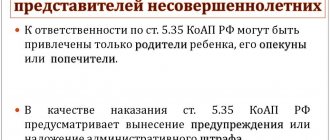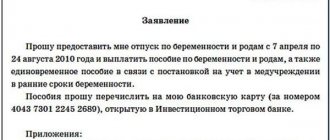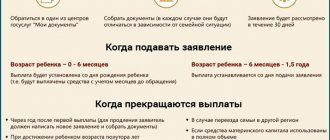As always, I advise and advise you, Elena Troskina. I am revealing my experience and knowledge in the legal field, my experience is more than 10 years, this makes it possible to give the right answers to what may be necessary in various situations and now we will consider - Payments to guardians in the Moscow region. If there are no professionals in your city, you can write your question, and I will answer everyone as I process it. Or it would be even better to ask in the comments regular readers/visitors who have previously encountered the same issue and may know other ways to solve it.
Attention please, the data may not be relevant at the time of reading, laws are updated and supplemented very quickly, so we look forward to your subscription to us on social media. networks so that you are aware of all updates.
- statement;
- guardian's passport;
- child's birth certificate;
- passport of the ward over 14 years old;
- an extract from the decision of the Public Protection Authority on the establishment of guardianship;
- a certificate from the bank confirming the registration of a nominal account for a minor;
- certificate of study at an educational institution (for children over 16 years old).
Who is entitled to guardianship payments?
Guardianship is the performance of actions to support another person. This could be a minor or a senior citizen. The ward can be of different status, for example, a disabled child, a disabled child, but their rights are protected by law. The state takes into account the specific needs of different citizens, allocating money for their maintenance through payments to guardians in the manner prescribed by relevant legislation.
Related articles: Single mother's benefit Monthly payment from maternity capital Receive unemployment benefits
To receive assistance, the guardian must meet the following requirements:
- age – up to retirement age (60 for men and 55 for women, excluding increases under the pension reform);
- income – below the subsistence level or non-existent (from an official source);
- the ward is disabled, and the guardian constantly looks after him.
To apply for benefits, you can meet all the requirements at the same time or only one of them. All conditions are interconnected, for example, caring for a disabled person does not allow you to work, although the guardian has not yet reached retirement age. Three conditions are met. The second example is the maintenance of a legally capable ward, which does not affect work activity, but the enterprise has gone bankrupt, has undergone layoffs, and there is no source of income. One condition is met, but the right to payment is present.
Benefits are assigned only to those citizens who are involved in raising a child/elderly child, organizing their life, and taking care of their health. Particular attention is paid to incapacitated and disabled persons. It is not enough for them to buy food and clothes. Often the baby’s limitations require specialized care, the involvement of medical workers, psychological specialists, and educational institutions. Such children are under special control of the guardianship and trusteeship authority and other social services. The same applies to caring for the elderly and pensioners.
Federal Caregiver Benefit
Federal guardianship payments are divided into three categories:
- One-time payment is a payment for guardianship, paid one-time, subject to application for their appointment no later than six months from the date of receipt of the corresponding status.
- Monthly benefits are transferred to parents for the maintenance of the person under their care. Assigned for each region separately. Depends on the age and social status of the family (large families, low income).
- Special – funds for the maintenance of disabled people or persons with limited capabilities. This also includes government benefits that the children themselves receive (for example, alimony).
The number of children in orphanages, increasing every year, is a serious incentive for the government to take the decisions necessary to reduce the number. Payments for parents who took custody of a child are one of them. The benefits must cover the costs of maintaining the minor. The minimum that guardians can claim starts from 15 thousand rubles. every month. The rules only apply to child custody cases. Care for an elderly person is provided free of charge, in rare cases - with compensation of 1.2 thousand rubles.
Regional payments
Each individual region has the right to assign payments to families for establishing child custody. Their size cannot be less than the guaranteed cash supplement from the state. The territorial allowance must correspond to the region of residence. For example, for residents of the northern regions (KhMAO, Yamalo-Nenets Autonomous Okrug, etc.), guardians receive an increased amount of benefits depending on the coefficient rate adopted at the beginning of the year. Thus, from February 1, 2018, payments for child custody will amount to more than 28 thousand rubles.
Payment terms
- kindergarten fees are reduced by at least 50%;
- all school textbooks are provided to the pupil free of charge;
- the child has the right to two free meals a day in an educational institution;
- The student has the right to study at preparatory courses in any higher or secondary educational institution free of charge.
Educational
Assistance in providing financial support for a foster child consists of monthly payments for each child under care. In accordance with Art. 37 of the Civil Code of the Russian Federation, a separate nominal account is opened for each guardian, into which these monthly payments are received.
At the same time, the conditions for receiving benefits do not indicate the need to officially appoint a guardian of this person. It turns out that any person, if he does not work officially and carries out the duties of caring for a disabled person of group 1 or an elderly person in need of guardianship, has the right to payments for guardianship. At the same time, he does not have the obligation to live with the ward, although he can live with him.
Regulatory framework
A family that has taken a person under guardianship or guardianship needs to be well versed in the legislation. The main issues of guardianship are regulated by:
- Law “On Guardianship and Trusteeship” dated April 24, 2008 No. 48-FZ (as amended as of January 1, 2018);
- Family Code of the Russian Federation;
- Civil Code of the Russian Federation.
Certain issues regarding tax benefits, mortgage lending privileges and other legal aspects of guardianship relationships are contained in federal and/or regional regulations and government regulations of a narrow focus. For example:
- Federal Law “On State Support for Large Families” No. 138-FZ of November 17, 1999 indicates a list of benefits provided not only to large families, but also to guardians;
- The Law “On Amendments to the Tax Code of the Russian Federation” N 117-FZ of August 5, 2000 added tax benefits for families who have received guardianship;
- The Labor Code of the Russian Federation N 197-FZ dated December 30, 2001 regulates the provision of extended leave to families with wards, including maternity leave.
According to the provisions of Law No. 48-FZ (literally):
- “...1) guardianship is a form of arrangement for minor citizens (minor citizens under the age of fourteen) and citizens recognized by the court as incompetent, in which citizens (guardians) appointed by the guardianship and trusteeship body are the legal representatives of the wards and perform everything on their behalf and in their interests legally significant actions;
- 2) guardianship - a form of arrangement for minor citizens aged fourteen to eighteen years and citizens limited by the court in legal capacity, in which citizens (trustees) appointed by the guardianship and trusteeship authority are obliged to provide assistance to minor wards in the exercise of their rights and fulfill their duties, to protect minor wards from abuse by third parties, as well as to give consent to adult wards to commit actions within the framework of the Civil Code of the Russian Federation..”
The main thing that adoptive parents need to understand is the difference between the concepts of “guardianship” and “trusteeship.” It is expressed in the age of the ward. Until the age of 14, a minor is placed under guardianship. After that - only guardianship. A child for whom guardianship has been issued (up to 14 years of age) remains so until adulthood, and when studying at a university - until 23 years of age. The law does not establish any difference in receiving monthly cash payments between categories.
Content:
- One-time payments
- Monthly payments
- Additional nuances
- Benefits for guardians
There are a lot of children in need of foster parents and full-fledged care, so the state, protecting their interests, provides child guardianship benefits that help provide him with proper care. Registration of child custody is a rather troublesome process and there must be enough funds to support the child. Of course, it is possible to take care of a person free of charge, but due to the financial situation of the majority of Russian citizens, they still require additional financial support. At the same time, the state carefully controls the spending of payments, making sure that money is invested in children, and not in the personal interests of guardians. How to obtain guardianship of a child and what payments are due to guardians?
If we talk in more detail about payments and benefits for guardianship, there are several types of them. The accrual amounts also differ, so the issue requires a more detailed consideration. So, in the article we will consider the issue: child custody: payments due to the guardian.
By the way, find out how to obtain temporary guardianship of a child if the parents cannot raise the child for some reason and what is the amount of the monthly child benefit?
What payments are due to a guardian of a minor in 2021?
Registration of child custody gives the right to receive cash payments at the federal and regional level, one-time, monthly, and specialized. Thus, for the maintenance of a minor, the guardian will receive (in addition to a one-time amount of approximately 16.5 thousand rubles) monthly:
- for a child under 12 years of age – about 16 thousand rubles;
- for a ward over 12 years old – about 22 thousand rubles;
- in a large family – 3.5 thousand more each.
Payments are made until the person reaches 18 years of age. When confirming the status of a full-time student - until graduation, but not more than 23 years. Education at a university for the eldest child affects the status of a large family and the amount of compensation for guardians. To confirm training, the student must provide a certificate of full-time study, issued by the dean's office, certified by the seal of the educational institution.
One-time benefit when transferring a child to a guardian
One-time assistance for taking a child into custody is subject to annual indexation. For example, in 2021, the level of payment to guardians was (approximately) 16,350 rubles. The specified amount is the minimum that adoptive parents have the right to count on. The guardian's allowance is paid to each ward. Receiving one-time assistance does not depend on family income.
Citizens who are officially employed are entitled to one-time payments when establishing custody of a child, as at birth. Maternity and one-time benefits are accrued in the amounts established by the collective agreement in compliance with labor legislation. Any parent, not just the mother, can apply for help from the employer. Amounts are calculated based on average earnings over the last six months.
Monthly payments from the regional budget
Payments to regional-level guardians significantly help families cope with the maintenance of children. Regardless of the salary level, additional financial assistance is needed for any region. Thus, for families living in Moscow, 16.5 thousand rubles are paid for the maintenance of children under 12 years old, 22 thousand rubles for older ones. Compensation is provided to each minor family member. Parents with many children receive more by about 10 thousand rubles in total.
Special reward
Not every family is ready to take a child. This is especially true for older children, from 6 years old. Regional authorities are trying in every possible way to help those who have decided to take guardianship, and to give a good incentive to those who have not yet taken action. Additional payments are calculated for each adopted child and can be set for different periods. For example, for residents of Moscow, special remuneration for guardians is provided:
- annually 10 thousand rubles. – for the needs of the child (school, kindergarten);
- for compensation for utilities and other housing and communal services - 800 rubles. monthly;
- compensation for travel to a place of recreation or recovery - about 4.5 thousand rubles once a year;
- limiting the maximum mortgage rate.
Amount of one-time payments for child guardians
The amounts of payments for guardianship are established by the Federal Law “On State Benefits for Citizens with Children” dated May 19, 1995 N 81-FZ. According to the current legislation (Resolution of the Government of the Russian Federation dated January 26, 2021 N 74), from February 1, 2021, a one-time benefit to a family taking a child into care is set at 17,479.73 rubles . The state indexes the size of such one-time payments annually. In some regions of the country, a larger one-time amount is paid for guardianship due to the existence of a regional coefficient.
Monthly payments for the maintenance of the ward
In case of adoption of a disabled child, a child over 7 years of age, as well as children who are brothers and (or) sisters, a one-time family benefit is paid in the amount of 133,559 rubles 36 kopecks as of 2021.
- A one-time benefit issued after the completion of the procedure for establishing guardianship, the amount of which depends on the number of children and the degree of their need, and is issued only for their maintenance. But when two or more children are placed in a family for upbringing, it is paid for each. The one-time benefit for guardians of minor children until February 2021 is 133,559 rubles 35 kopecks . The specified size is indexed annually (read more about this in the article). In this case, the guardian can count on personal, additional benefits.
- Monthly allowance . Guardians, being representatives of their wards, are obliged to educate them and represent their legitimate interests; the financial side of the issue is partially taken over by the state. It provides care for the person under guardianship until he reaches the age of 14; the amount of the benefit is established in the region of residence.
Payment for guardianship of a disabled child
Maintaining a disabled child requires additional expenses for treatment and specialized training. Families who decide to take custody of such children have the right to receive an additional benefit of 5.5 thousand rubles. every month. A special feature for this category is the right to receive a land plot free of charge or with preferential conditions. Norms and rules are regulated by regional legislation. You can find out more details at social protection centers.
Payments may change annually, their size depends on indexation. It is legally guaranteed that a disabled child will receive an increased benefit. Parents who find out about the amount of 5.5 thousand sometimes do not even submit documents for assistance, forgetting about the guaranteed minimum for the ward. The basic monthly compensation provided for by law, for example, in a family with one disabled child under 12 years old, will be 16 thousand + 5.5 thousand = 21.5 thousand rubles, for a minor over 12 years old - 22 thousand + 5 .5 thousand = 27.5 thousand rubles.
Additionally, a disabled child has the right to receive a disability pension. Depending on the group established in the medical report, payments will range from 5.5 to 25 thousand rubles. Funds are paid to the child’s card account; the guardian is allowed to manage (withdraw from the account) with a special power of attorney. Details can be found on the Internet portals of the Pension Fund (PF) or Social Insurance Fund (SIF).
Amount of one-time payments for child guardians
Guardians or trustees who, in accordance with federal legislation, have entered into an agreement on paid terms that does not provide for payment of remuneration from income from the ward’s property or funds from third parties, are paid a monthly remuneration in the amount of 3,000 rubles.
Payments to guardians for children in Moscow in 2021
- 9,200 rubles per month for raising one child over 3 years old, classified as health groups I-II;
- 12,650 rubles per month for raising one child under the age of 3, classified as health groups I-II;
- 25,000 rubles for raising one child classified as health groups III-V.
Payments are made monthly. In addition to them, municipal authorities are ready to compensate the guardian for certain types of expenses for the child, in particular: the purchase of children's things and toys - 1,668 rubles; purchase of furniture - 24,940 rubles. (one time). Provided that the child is taken from an orphanage and is under guardianship for more than one year, 12,569 rubles will be allocated from the municipal budget in 2021 as a one-time allowance to the guardian.
- One of the parents (official representatives of minors) registered in the region on a permanent basis.
- If the minor giving grounds for payment also lives in the region with the applicant.
- You should apply for benefits at territorial social protection offices (multifunctional centers).
- Specialists are given ten days to study the documents, after which the applicant receives a reasoned response.
- Most of the local payments (there are exceptions) are due to parents, regardless of whether they have a Russian passport:
- citizens of Russia;
- nationals of other countries;
- refugees and stateless persons.
How much do caregivers pay for an elderly person?
The regulatory framework stipulates that elder care has nothing to do with the general rules for caregiver compensation. Getting benefits is very difficult. To do this, you must simultaneously meet the following requirements:
- care is provided for a disabled person of group 1;
- the guardian has not reached retirement age;
- there is no income in the form of wages.
If all indicators are met, compensation can be received by any person caring for an elderly person, for example, children, but neighbors can receive it. There is no special need to formalize guardianship. The amount will be 1200 rubles per month. An exception is payments for residents of certain regions, for example, northerners. Such citizens will receive up to 5,500 rubles maximum.
Conditions for receiving compensation
Not everyone can receive payments due to guardians. The following persons will not be able to receive compensation or even obtain guardianship in any way:
- incompetent;
- minors;
- convicted;
- deprived of parental rights;
- those who have lost the right to guardianship by decision of government bodies;
- unable to cope with the responsibilities of supporting children due to health reasons.
Payments are due to capable persons who have not reached retirement age, without a main source of income, who applied for benefits on time:
- six months from the date of registration of guardianship – for monthly payments;
- three days for one-time assistance.
How to apply?
Foster parents and foster carers, in addition to monthly and one-time benefits, as well as compensation for utilities, can receive remuneration for the performance of their duties. This is only possible if, instead of a guardianship agreement, a foster family agreement is concluded.
Documentation
If the person under guardianship is diagnosed with a disability, a medical certificate will be required. The remuneration is paid monthly within the terms established by the legislation of the subject. Applications are reviewed within 10 days.
The Family Code of the Russian Federation provides that guardianship (trusteeship) can also be in the form of transferring a minor to a foster family. In this case, an agreement is concluded between the authorized body and the adoptive parents. For raising their wards, foster parents receive a certain reward - this is their kind of salary. As a general rule, the guardian of an adult incapacitated person performs his duties free of charge. But in some cases, he may still receive small cash payments from the state.
- If the guardian has no income and does not work;
- If his age corresponds to the age of a working person: from 14 to 65 years for men and up to 60 years for women;
- His guardianship responsibilities extend to an elderly person over 80 years old, an elderly person who requires constant care, or a disabled person of group 1.
Guardianship payments and benefits in 2021: amount
Turkish resorts are one of the most popular tourist destinations among Russians. This is due both to the quality of service and the low price of the tourism product, and to the ease of obtaining entry documents - there is a visa-free regime between the Russian Federation and Turkey. However, immediately before the trip, another question may unexpectedly arise: is it necessary? permission for a child to travel to Turkey from the second parent in 2021?
Also, many regions provide separate cash payments for pupils and guardians to attend various cultural or sporting events. Payments are made in the form of additional payments. In each region, payment amounts are set independently and may vary significantly from region to region.
We recommend reading: How to move from an apartment building to a residential building
The procedure for registering guardianship
Payments to guardians are not simply transferred to the card. To obtain them, you need to apply for a special status, obtain permits, and collect certificates. First, you need to formalize guardianship. Maintaining a child on a voluntary basis, without receiving a document from the guardianship authority (for example, an agreement on registration with a foster family) does not give the right to receive payments.
To register you need:
- obtain guardianship;
- discuss with a representative of the guardianship and trusteeship authority what benefits the family is entitled to;
- contact the social protection fund of the region where the guardians are registered.
Where to contact
To apply for benefits, it is not necessary to stand in line at the funds. It is convenient to carry out the entire procedure at the multifunctional center (MFC) at the place of registration. It is not necessary to go to the center; all stages can be completed on the official portal “Public Services”. The place where you seek help does not matter; all data is forwarded to the FSS.
What documents are required
It is necessary to provide copies and original documents to special authorities according to the list:
- application for payment processing;
- guardian's passport;
- birth certificate of the ward or passport;
- guardianship document;
- a certificate of examination of conditions and confirmation of cohabitation with the ward;
- certificate from the place of study;
- bank card details.
Registration by personal presence at the Social Insurance Fund involves submitting all documents in a package. At the MFC, copies of documents will be made directly by the inspector. Each document will be printed and certified by the applicant. The guardian will receive a receipt with a list of documents submitted. To apply through the portal, you need to scan the papers yourself and then attach them electronically. The portal guarantees the protection of information (personal data).
○ Responsibilities of guardians and trustees.
The rights and obligations of guardians and trustees are established by the norms of civil and family law.
Clause 1 of Art. 15 Federal Law No. 48 “On Guardianship”: The rights and obligations of guardians and trustees are determined by civil law. The rights and responsibilities of guardians and trustees regarding the education and upbringing of minors are determined by family law.
At their core, the responsibilities assigned to a guardian are exactly the same as those of biological parents. They are as follows:
- Caring for the ward.
- Providing the child with quality food, housing and clothing.
- Provide assistance in obtaining medical services as required.
- Providing assistance in obtaining education, as well as physical and moral education.
- Protecting the interests of the child in various authorities.
- Living together with a child until he reaches 16 years of age.
- Notifying the guardianship and trusteeship authorities of a change of residence in a short time.
- If the child has relatives, do not interfere with their meetings.
- Spend money on the child’s needs and on organizing his leisure time.
The rights of guardians are also similar to those of biological parents.
Labor and tax benefits
Payments to guardians are not the only support from the state. The Labor and Tax Codes of the Russian Federation contain a number of provisions for additional legal protection of guardians. Labor benefits include:
- Possibility of part-time employment for persons whose ward is under 14 years of age. The wage level will be calculated on an hourly basis and may not reach the legal minimum.
- The right to additional leave. The standard rule states the right to leave (maternity leave) if the ward is less than 3 years old. Payment of 40% of average monthly income will remain only for the first 1.5 years. If permitted by collective bargaining agreement, a caregiver may qualify for an additional 14 calendar days of unpaid leave. You can use it all at once or in parts.
- Receiving an additional day off once a week (no more than 4 per month) if caring for a disabled child.
- Caregivers of young children are not allowed to offer night work or overtime without their written consent.
- The right to a single leave to accompany the ward to the place of admission to a higher educational institution.
Tax benefits include the right to receive a tax deduction. It is expressed in the absence of personal income tax charges of 13% on part of income from wages, financial assistance, vacation pay and compensation. Provided to one of the parents in full, or to both in equal parts:
- 1400 – for the first two children;
- 3000 – for the third and subsequent ones;
- 6000 – for a person supporting a disabled person.
Confirmation of the right to receive benefits occurs after submitting an application addressed to the manager with the provision of documents. It can be issued by filing a tax return for the previous calendar year. To do this, you should contact the Federal Tax Service at the place of registration or the MFC. There is the right to file a deduction through the Internet portal of the State Services website.
Social benefits
Benefits and allowances provided to guardians help improve the living conditions and development of their wards. The listed benefits and allowances are enshrined in law and are mandatory for use on the territory of Russia.
Tax benefits
Questions about what benefits and payments are due to guardians are regulated in nature and are enshrined in Federal Law No. 81-FZ dated May 19, 1995, as well as in Order of the Ministry of Health and Social Development of Russia dated December 23, 2021 No. 1012n. As for the amount of benefits for guardians in 2021, it is established by the relevant decree of the Government of the Russian Federation.
You should apply for payments no later than six months after the child reaches 1.5 years of age. Payments are made for the entire period from the date of provision of care leave. The issue of appointment is resolved within 10 days.
One of the most pressing questions among people who have taken guardianship of children is how much guardians are paid. In 2021-2021, they can receive payments for the maintenance of minors and one-time benefits. Foster parents are paid an additional salary. Also, everyone is provided with labor, tax, social and housing benefits. Let's look at all the subtleties in more detail.
One-time benefit
According to Art. 322 of the Labor Code of the Russian Federation, a working guardian has the right to ask the employer to provide paid leave for at least 14 years if he needs to accompany a child under 18 years old who is going to enroll in a university or college in another city.
A citizen can try to establish guardianship over a specific child, or find out about other children who need care. At the time of registration of rights, the ward must be no more than 14 years old, otherwise we will be talking about guardianship.
Guardianship and adoption are often confused by people due to their similarities. Both concepts are a form of family education of minors who are deprived of parental care. However, obtaining guardianship is much easier and faster than adopting a child. In the first case, less stringent requirements are imposed on the candidate. They can be a single person, but when adopting, preference is given to couples.
We recommend reading: Until what age can you work in a government agency?
Who can receive monthly guardianship payments?
- receiving maternity leave until the ward reaches 3 years of age;
- sick leave for a child under seven years of age for the entire time necessary for his recovery, and 15 days if the children are older;
- work on a reduced schedule (optional);
- Until the ward turns 5 years old, the caregiver does not have the right to be assigned to night shifts;
- four additional days off monthly if the child has disabled status;
- vacation paid at a time convenient for the guardian;
- if necessary, accompanying the person under guardianship to another city to enter an institute or secondary vocational educational institution; They also provide part of the annual leave (minimum 2 weeks).
Separately, it is worth talking about the monthly payment to guardians caring for disabled children or adult disabled people of group 1 who received disability before the age of 18, that is, in childhood. For guardians of such persons, the monthly payment is established by Decree of the President of the Russian Federation No. 175 of February 26, 2021 “On monthly payments to persons caring for disabled children and disabled children of group I” and amounts to 10,000 rubles per month. This amount of monthly payment from the budget is provided either for the parents of a disabled child / disabled since childhood of group 1, or for the caregiver of such a disabled person, or for a guardian.
Amounts of payments and factors influencing their value
- The amount of the lump sum benefit is subject to annual indexation in accordance with inflation. The amount of this benefit also depends on the regional coefficient, therefore it is influenced by the place of residence of the ward, since the regional coefficient differs in different places. As of 2021, this payment averages 16,873.54 rubles.
- The size of monthly payments is also influenced by the region of residence of the ward and guardian. In most regions, the standard of living of citizens differs significantly. The largest monthly payments were recorded in Moscow and the Moscow region. Their size is depending on the age of the child: 16,500 rubles if he is under 12 years old, and 22,000 rubles if he is 12 years old and older. If the child is disabled, then the monthly payment for him is 27,500 rubles. When a child is taken into care in a foster family and three or more children come with him, they are assigned an allowance of 19,800 rubles for each child under 12 years of age, and 25,300 rubles for children aged 12 years and until they reach adulthood. Payment amounts in other regions are much smaller. The exception is St. Petersburg and its region, as well as regions of the Far North and Far East, where payments are comparable to the amount of benefits in the Moscow region.
- The amount of payment to guardians for their obligations as foster parents is influenced by the number of children taken into the family. If there are several children, the payment amount increases accordingly. The amount of the surcharge also depends on what health group is assigned to the ward. The higher the group, the weaker the child’s health. If he has the third and fourth groups, he needs more funds for treatment than for a child with the first and second health groups. Therefore, the surcharge will be increased by 1.5 or 2 times. Payments are also indexed in accordance with the size of inflation and the regional coefficient.
To summarize, it should be concluded that the amount of benefits paid is influenced, in addition to the regional coefficient and inflation:
- the age of the child, because as he grows older, his needs increase;
- the number of children taken into care and the total number of children living in the family, because large families are entitled to additional benefits;
- whether the guardian is a working citizen or not. For non-working guardians, payments are provided in the amount of 2908.62 rubles for one child, 5817.24 rubles for each of two or more children. For a working guardian, a payment is provided in the amount of 40% of the average wage, but it should not exceed 23,120.66 rubles.
Types of benefits provided for payment to guardians of children
Payments and benefits provided to guardians of minor children are regulated by Federal Law No. 81. The amounts of provided benefits are established in government regulations of the Russian Federation and are constantly indexed.
Important! According to the legislation of the Russian Federation, the determination of the amount of social benefits for guardians of children is left to the discretion of the regions. The government only sets general rules for payments.
The following types of payments are provided:
- a lump sum payment transferred once immediately after the child is taken into custody;
- monthly payments of benefits provided by the state to compensate for the costs incurred by the guardian for the maintenance and upbringing of the child under his care;
- a special additional payment intended for the guardian who accepted the child into the family when he fulfills his duties for a fee. It is assigned according to the place where the child lives and is registered and depends on the region in which the family lives. If there are several children, the payment amount increases accordingly. The amount of the surcharge also depends on what health group is assigned to the ward. The higher the group, the weaker the child’s health. If he has the third and fourth groups, he needs more funds for treatment than for a child with the first and second health groups. Therefore, the surcharge will be increased by 1.5 or 2 times.
At the discretion of the regions, guardians may be provided with separate benefits and compensation for payments, as well as various subsidies for paying housing and communal services bills, telephone payments, etc. Tax deductions and benefits are provided for working guardians. They have the right to part-time work, as well as compensation for the costs of travel for children to summer camps, sanatoriums, etc.
Requirements for candidates for guardianship
According to the requirements of the RF IC and the RF Civil Code, a person can be appointed as a guardian only with his personal consent, which is confirmed by the voluntary submission of an application for guardianship to the guardianship authority. Compulsion to perform guardianship duties does not correspond to the interests of the child himself and the very purpose of appointing guardianship.
A legally competent citizen who has reached the age of majority, not older than 60 years, may be a guardian if he:
- has not previously been deprived of the right to be a parent, guardian or trustee;
- has no addictions to alcohol or drugs;
- can perform guardianship duties due to health reasons.
Thus, the applicant for guardianship must be a physically healthy, capable citizen of the appropriate age, capable of creating conditions favorable for the upbringing and development of the ward.
Expert commentary
Leonov Victor
Lawyer
According to these requirements, senior citizens who have reached 60 years of age are not allowed to become guardians. However, in exceptional cases, if the citizen is a close relative of the child, for example, a grandmother, to whom the child is attached and already lives with her, guardianship over him may be entrusted to this relative. This decision will be made provided that the health status of the guardian allows him to perform his duties.
Both individuals and married couples can be appointed to serve as guardians. The official appointment of guardianship occurs only after the guardian or adoptive family signs an agreement with the guardianship authorities on the obligations assumed. After this, the guardian has the right to receive the required benefits and benefits.
Benefits for guardians in 2019
The law guarantees all citizens who have taken guardianship or trusteeship of a minor a number of one-time and regular benefits and payments from the federal and regional budgets and, in addition, a number of certain benefits also designed to ease the burden of caring for an adopted child. First, let's figure out what benefits are available to guardians.
Labor benefits
If a citizen has formalized guardianship and is officially employed, the employer is obliged to provide him with the following privileges, rights and benefits:
- Providing leave of one to two months upon request if there is one ward child and, possibly, for a longer period if there are two or more wards.
- The right to extraordinary leave at any time in the event of illness of the ward.
- The right to maternity leave while maintaining labor benefits from the employer.
- At the request of the guardian, the length of the working day or week can be adjusted with a proportional reduction in remuneration.
- If the ward is under five years old, his guardian has the right to refuse business trips, work beyond the regular schedule, late and night shifts.
Tax benefits
Citizens who have guardianship over minors have the right to a reduction in the tax rate. First of all, this concerns the personal income tax deduction:
- from 1,400 rubles for the first and second children;
- from 3,000 rubles for the third and fourth children;
- from 6,000 rubles - if the child has a disability.
Attention! If a family has guardianship for two adults, the tax deduction is divided in half between them.
In addition to income tax, the guardian has the right to adjust downward the amount of payments for any other taxes that they pay.
Benefits in medicine
- children under three years of age for whom guardianship has been issued have the right to free provision of a number of medications on the basis of a preferential prescription from the attending physician;
- guardians of children under 2 years of age have the right to receive free baby food (the prescription is issued by the child’s local pediatrician);
- Disabled children have the right to undergo free rehabilitation and sanatorium treatment.
Benefits in education
In different regions, support for families of wards in the field of education is provided in different ways. Basically, the following benefits are provided to the guardian everywhere:
- reduction of fees for attending a children's educational institution by 50-100% depending on the region of residence;
- providing free meals twice a day;
- provision of free textbooks;
- in a number of educational institutions (secondary and vocational schools) - free attendance at preparatory courses.
Fringe benefits
State support is not limited to the listed benefits. The ward’s family also has the right to count on additional benefits provided by regional budgets:
- reduction in the amount of payment for utility bills;
- the right to receive one-time payments from the local budget.
Conditions for assigning payments
All payments to guardians who perform their duties free of charge are intended for targeted expenses for children taken under guardianship. These include costs:
- for food, clothing, and any household items necessary for the life of the ward;
- to pay for medicines, medicines and treatment of the child;
- to pay for additional clubs, sections and any services related to the development of the child;
- to attend cultural events, theater, cinema, exhibitions, educational trips, etc.
That is, all funds paid must be spent by the guardian exclusively on the child. However, he may receive some compensation if combining guardianship with official work becomes a problem for him and he is forced to leave it.
Payments for a child are assigned only under certain conditions. They are paid only if the child in custody is an orphan, because his biological parents have died, are officially declared missing, or have been deprived of parental rights, as well as if they are serving a criminal sentence.
Expert commentary
Kolesnikova Anna
Lawyer
Payments are not provided if the child has parents, but due to current circumstances they cannot temporarily raise and care for him. For example, parents went on a long business trip for official business. In this case, when appointing a guardian, the parents must bear all expenses for the maintenance of their child themselves.
There are special features for assigning benefits when the child turns 16 years old. The caregiver will have the right to receive benefits for the maintenance of the teenager only if he continues his studies at a school or institute. It will be paid until graduation. At the same time, every six months the guardian is obliged to provide the social security authority with a certificate confirming the child’s education.







